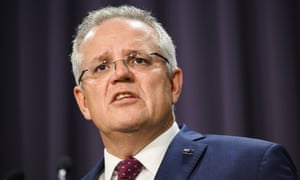Cabinet remains unified around Coalition emissions reduction target of 26% to 28% of 2005 levels by 2030
Scott Morrison’s senior ministers discussed how best to reposition
the government’s climate change policies in a cabinet meeting on Monday.
After Morrison claimed that there were no members of his frontbench wanting stronger action on climate change policy, sources have told Guardian Australia that ministers discussed the issue at length in the cabinet meeting that followed in Canberra that day.
Some cabinet ministers are understood to have expressed the view that there is a need for the government to step up action in a way that is both “genuine and believable” in the year ahead.
However, no one argued for any substantial policy change that strayed
from the Coalition’s election commitments, with senior members of the Coalition unified around the government’s emissions reduction targets of 26% to 28% of 2005 levels by 2030.After Morrison claimed that there were no members of his frontbench wanting stronger action on climate change policy, sources have told Guardian Australia that ministers discussed the issue at length in the cabinet meeting that followed in Canberra that day.
Some cabinet ministers are understood to have expressed the view that there is a need for the government to step up action in a way that is both “genuine and believable” in the year ahead.
The potential of carryover credits not being used to meet the Paris target was also discussed in line with the government’s changing public rhetoric that the credits would only be used “if needed”.
It is understood that the cabinet discussion was focused on what more could be done in the area of climate change policy other than emissions reduction targets, including in the areas of transport, energy and fuel.
The government has been talking up the importance of technologies such as hydrogen, carbon capture and storage, lithium production, biofuels and waste-to-energy as ways to reduce Australia’s carbon footprint as it has sought to deflect criticism about its response to climate change.
Morrison has been under mounting pressure to explain how he intends to “evolve” the government’s climate change policies after he indicated the government would do more in the wake of the bushfire crisis.
The prime minister has conceded the severity of the fire season is partly caused by climate change, but has sought to shift the focus to “adaptation and resilience” and a “practical” response, rather than on emissions reduction measures.
Speaking on Sky News on Tuesday night, Morrison said “hazard reduction is as important as emissions reduction, and many would argue more so because it has a direct practical impact”, he said.
He also flagged the possibility of new national standards that would report on how states were tracking on hazard reduction performance.
Some Coalition MPs believe that the government can not win any political fight on climate change, and that no policy change is needed. There is particular concern among some conservatives about a possible shift to a net zero emissions target by 2050.
The government has undertaken to look at shifting to a net zero by 2050 commitment through the Pacific Islands Forum, but Morrison said this week that “people who make these commitments need to be able to tell people what it will cost them”.
“We need to understand what that means – I mean, people can say that, but what does that mean for jobs? Now I can’t answer that question right now … But I’m concerned it wouldn’t be a good thing.”
But in a sign of the political challenge facing Morrison, moderate MPs in inner-city seats are at the same time pushing for more ambitious action, amid concern that climate change will be a hot button issue at the next election.
On Tuesday, the energy and emissions reduction minister, Angus Taylor, talked up the government’s “overachievement” for emissions reduction, saying the government’s position was clear that Australia would only use carryover credits if needed.
“The result of Australians overachieving on our 2012 targets and on our 2020 targets … means there is less carbon dioxide in the atmosphere as a result of the hard work of Australian families, households and businesses, and we believe that we should be given credit for that,” Taylor told Sky News.
“We are ahead of the game and our targets are a floor, not a cap, they are not a cap on our ambition and we will continue to work hard to meet and beat those targets by 2030.”
According to the latest government projections of Australia’s emissions, Australia will only meet its 2030 target of reducing emissions by between 395m tonnes and 462m tonnes by relying on 411m tonnes of carryover credits.
The trade minister, Simon Birmingham, said on Monday he wanted the government’s “ambition” to be achieving the emissions reduction targets without the need for carryover credits.
“That’s got to be the ambition in terms of the way in which we seek, as a government, to be able to reduce our emissions and reduce Australia’s emissions into the future and applying all of those new technologies,” Birmingham said.
Morrison this week smacked down the New South Wales environment minister, Matt Kean, for suggesting federal Liberals were pushing the government to increase its ambition on emissions reduction and abandon the use of carryover credits.
“Matt Kean doesn’t know what he’s talking about, he doesn’t know what’s going on in the federal cabinet [and] most of the federal cabinet wouldn’t even know who Matt Kean was.
“We are dealing with our climate policies in the same way as we took them to the election … we will meet and beat our emission reduction targets,” Morrison said.

No comments:
Post a Comment